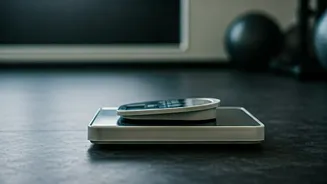Weight Loss Success
The first and most obvious sign of a successful calorie deficit is, undoubtedly, weight loss. However, it's not just about seeing the numbers on the scale
decrease. It is essential to recognize the pattern of weight loss: sustainable and steady. Aim for a loss of about 1-2 pounds per week, as faster weight loss might not be sustainable and could lead to muscle loss. Monitor your weight consistently, perhaps once or twice a week, and note the trends. Fluctuations are normal, but a downward trend over weeks indicates your calorie deficit is working in your favor. If weight loss stalls for extended periods, it might signal the need to reassess your calorie intake or activity levels. Remember to remain patient, as the process takes time, and results will vary.
Increased Energy Levels
Initially, starting a calorie deficit might leave you feeling sluggish. However, if your deficit is well-managed and your diet is nutrient-rich, a remarkable change is coming: increased energy. As your body adapts to burning fat for fuel, you should begin to feel more energetic throughout the day. This enhanced energy can be especially noticeable during workouts or daily tasks. Are you finding it easier to get through your routines without feeling drained? This could be a positive sign. Persistent fatigue could indicate the need to slightly increase calorie intake or reconsider your macronutrient balance, making sure to include enough healthy fats, proteins, and complex carbohydrates to fuel your body effectively.
Improved Mood & Focus
Beyond physical effects, a well-implemented calorie deficit can influence your mood and cognitive abilities. As your body adjusts and stabilizes, you may find your mood improves. Fewer mood swings and a sense of general well-being are often linked to a balanced diet and steady energy levels. Alongside this, many people report enhanced focus and mental clarity. Being free from constant hunger pangs allows you to concentrate better on tasks. If you're noticing an overall improvement in your mental state, along with sustained energy and physical changes, it's very likely your calorie deficit is being done correctly. Conversely, if you feel irritable or have difficulty concentrating, then make a review of your calorie needs.
Better Sleep Quality
A consistent calorie deficit, supported by a healthy diet and exercise, can positively impact your sleep patterns. A well-nourished body that is getting the right amount of calories and nutrients, often experiences deeper and more restful sleep. This can be especially true if you are also exercising regularly. Better sleep enhances recovery, supports hormone regulation, and further boosts your overall health. Are you waking up feeling refreshed and ready to go? If so, this can be a strong indication that your body is recovering well and your calorie deficit is working. Poor sleep, on the other hand, might suggest that your body isn't getting adequate rest, which could warrant examination of your dietary choices and sleep hygiene.
Enhanced Workout Performance
If you're exercising regularly, your workout performance is a key indicator of your body's response to your calorie deficit. Initially, you might feel a slight dip in performance as your body adapts to using fat for fuel. However, if your calorie deficit is balanced, and if you are eating adequate protein and carbohydrates, you should experience improved endurance, strength, and recovery over time. Are you setting new personal bests in your workouts, or do you find yourself able to exercise for longer durations with less fatigue? This is a great indicator that your body is adapting and getting stronger. If, however, your workout performance continues to decline, review your calorie intake, adjust your macro-nutrient distribution, and consider incorporating more recovery time.
Healthy Skin & Hair
A balanced calorie deficit combined with a nutrient-rich diet can have noticeable effects on your skin and hair. As your body receives the vital nutrients it needs, you might experience improvements in skin clarity, radiance, and overall health. Furthermore, many people find that their hair becomes shinier, stronger, and grows faster. These changes are often connected to improved hydration and sufficient intake of essential fatty acids, vitamins, and minerals. If your skin glows and your hair appears healthier, it may be a positive sign that your body is getting the nutrients it needs, and you are losing weight. On the other hand, if your skin becomes dry or your hair becomes brittle, reassess your diet and consider consulting a healthcare professional.
Reduced Cravings
One of the most challenging aspects of a calorie deficit is managing cravings. However, as your body adjusts and stabilizes, the intensity and frequency of cravings should decrease. A well-planned diet rich in protein, fiber, and healthy fats will contribute to you feeling fuller for a more extended period and will help curb the urge to overeat. Are you feeling more in control of your eating habits and less driven to snack between meals? This could mean your calorie deficit strategy is working correctly. If cravings continue and you find yourself struggling with hunger, carefully consider your portion sizes and the distribution of your meals, or look at your hydration and exercise schedule.
Consistent Bowel Movements
A healthy digestive system is crucial during a calorie deficit, and regular bowel movements are a key sign of good gut health. Adequate fiber intake, plenty of water, and regular exercise all help maintain consistent bowel movements. If you’re experiencing regular, comfortable bowel movements, that’s often an indication that your body is efficiently processing nutrients and your overall health is improving. Problems such as constipation might signal a need to improve the balance in your diet. Increasing your fiber intake, staying hydrated, and making sure to drink enough water, as well as increasing physical activity, could help improve the function of your digestive system.
Clothes Fit Better
One of the most exciting and easily visible signs your calorie deficit is succeeding is the way your clothes fit. As you shed excess weight, you'll start to notice that your clothes become looser around your waist, hips, and other areas where you tend to carry extra weight. This change doesn’t always happen instantly, but over time, your wardrobe will feel like it’s becoming more comfortable. You may start needing to buy smaller sizes. If your clothes are fitting better, it's a clear signal that you are losing weight and your calorie deficit is working. If your clothes still fit the same, re-evaluate your measurements, and analyze your eating habits.
Stable Hormone Levels
A calorie deficit can influence hormone levels, especially those related to metabolism, appetite, and energy. A well-managed deficit will help maintain these hormones at stable levels. Fluctuations in hormones can sometimes lead to increased cravings, mood swings, or problems with sleep. If your hormones are balanced, you'll feel better overall. To assist in regulating these hormones, consider a balanced diet. If you experience persistent issues, speak with a health professional. Hormonal imbalances often show themselves in many ways, but knowing about them can help you in your overall weight loss journey.
Improved Body Composition
Beyond the scale, changes in body composition offer essential insights into the effectiveness of your calorie deficit. Body composition is the ratio of fat to muscle in your body. If your deficit is designed correctly, you should be losing fat while preserving or even gaining muscle mass. Methods like measuring body fat percentage or using specialized scales can provide detailed feedback. If your body fat is decreasing, and your muscle mass is either stable or increasing, your calorie deficit is helping you make the changes you want. If, however, you observe a significant loss of muscle mass, you will need to re-examine your eating plan to ensure you're getting adequate protein and other essential nutrients to maintain muscle mass.
Sustainable Lifestyle Changes
Finally, the most important indication of a successful calorie deficit is your ability to maintain the changes. It's not just about reaching your weight loss goal but about implementing changes that become a part of your daily life. This includes adopting healthy eating habits, regular exercise, and consistent attention to your physical and mental well-being. A diet that is too restrictive is almost impossible to maintain long-term. If you've been able to integrate these changes into your lifestyle without feeling deprived or overwhelmed, this is a strong sign that your calorie deficit strategy is effective. If you’re finding the changes difficult to maintain, consider making adjustments such as a more moderate calorie deficit or seeking support from a registered dietitian or certified fitness trainer.




















